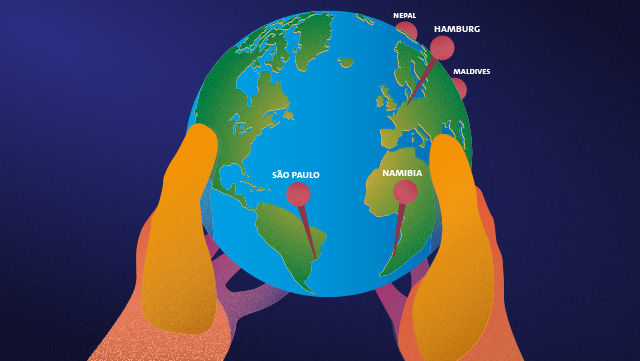Climate change adaptation can only succeed with local actors

Though hardly surprising, the conclusion of the Hamburg Climate Futures Outlook 2024 is nonetheless sobering: it is currently unrealistic that net-zero CO2 emissions will be achieved – that is, that all remaining emissions will be completely compensated for – by 2050. There is also little reason to believe that global warming will be limited to 1.5 °C: neither has industry strictly oriented its strategies on climate protection, nor is consumption becoming less CO2-intensive. And money continues to be invested in fossil energies. All these factors make adapting to climate change more important than ever. But how can it best be done?
In the Hamburg Climate Futures Outlook, an interdisciplinary team of Hamburg-based researchers regularly takes a closer look at the status quo of climate protection and climate change adaptation. They evaluate the current state of research and network with colleagues “on the ground” in regions around the globe – from Northern Frisia to the Kunene region of Namibia, from Taiwan to São Paulo, Brazil – to shed new light on various habitats, climatic conditions, approaches, and political contexts.
While it might not matter much where climate protection takes place, climate change adaptation can only work at the local level. Further, it can only succeed by being sustainably planned and implemented. And there’s plenty of room for improvement: all too often, specific dominant technologies, and in some cases corruption, are what determine which measures are actually pursued. Or successes are achieved at the cost of massive side-effects: for instance, if forests are restored using monocultures, it can make them more vulnerable to pests. Adaptation is only sustainable when the habitat-specific conditions and the knowledge of local actors are included in the planning and implementation. Farmers, for example, know better than anyone how agriculture works in their home region and how it is changing with the climate. Further, the goal of adaptation measures is to reduce social inequities, not worsen them. These findings, arrived at by the researchers, are in turn shared with societies, helping promote intelligent concepts and effective adaptation measures.
Further Information
Project website:
www.cliccs.uni-hamburg.de/de/publications/hamburg-climate-futures-outlook.html
Publications:
Hamburg Climate Futures Outlook 2024
News: How to make climate adaption a success
Since 2019, through Germany's Excellence Strategy the project has received funding from the German Research Foundation (DFG) as the University of Hamburg's Cluster of Excellence for climate research “CLICCS – Climate, Climatic Change, and Society.”
